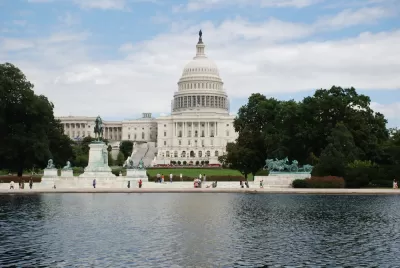The final version of the tax reform bill included some surprises with regard to housing and infrastructure funding mechanisms threatened in previous version of the bill.

[Updated December 18, 2017] "House and Senate negotiators struck a compromise agreement late last week paving the way for final votes this week on tax reform," according to an article by Jason Jordan on the American Planning Association's website. "Thanks in large part of the work of planning and community development advocates, most of the imperiled infrastructure, economic development, and housing tools survived in the final legislation."
The post goes through a list of proposed tax reform items with relevance to the list of concerns mentioned above. As explained by Jordan, the final compromise version of the tax reform bill is headed to the House for a vote on Tuesday, and the Senate later in the week.
- New Markets Tax Credit – "As with PABs, the House had proposed elimination of New Markets Tax Credits. However, the final bill maintains NMTC for 2018 and 2019 with annual $3.5 billion allocations."
- Historic Tax Credit – "The compromise bill adopts the Senate’s approach to the Historic Tax Credit. The legislation maintains the HTC but, in a change from current law, requires investors to claim the credit over five years."
- Low Income Housing Tax Credit – "LIHTC was maintained in the legislation in its current form. The conference committee rejected proposals to eliminate the existing exemption for artist housing, as well as new provisions for rural housing. The preservation of PABs was also an essential element of maintaining the effectiveness of LIHTC."
I've just listed a sample, but the original post has more on issues like Private Activity Bonds and the Mortgage Interest Deduction. Another article by Jeremy Zremski includes additional details about the tax reform bill, with specific focus on the Historic Tax Credit.
[Update: Conor Dougherty also provides specific coverage on the expected impact of the final version of the tax reform bill for homeowners. "Today, a little under half of American homes are worth enough to justify itemizing mortgage interest and property taxes," according to Dougherty. "Under the tax legislation, that figure would fall to close to 14 percent."
FULL STORY: Most Planning, Development Tools Survive in Tax Reform Compromise

Alabama: Trump Terminates Settlements for Black Communities Harmed By Raw Sewage
Trump deemed the landmark civil rights agreement “illegal DEI and environmental justice policy.”

Planetizen Federal Action Tracker
A weekly monitor of how Trump’s orders and actions are impacting planners and planning in America.

Why Should We Subsidize Public Transportation?
Many public transit agencies face financial stress due to rising costs, declining fare revenue, and declining subsidies. Transit advocates must provide a strong business case for increasing public transit funding.

Understanding Road Diets
An explainer from Momentum highlights the advantages of reducing vehicle lanes in favor of more bike, transit, and pedestrian infrastructure.

New California Law Regulates Warehouse Pollution
A new law tightens building and emissions regulations for large distribution warehouses to mitigate air pollution and traffic in surrounding communities.

Phoenix Announces Opening Date for Light Rail Extension
The South Central extension will connect South Phoenix to downtown and other major hubs starting on June 7.
Urban Design for Planners 1: Software Tools
This six-course series explores essential urban design concepts using open source software and equips planners with the tools they need to participate fully in the urban design process.
Planning for Universal Design
Learn the tools for implementing Universal Design in planning regulations.
Caltrans
Smith Gee Studio
Institute for Housing and Urban Development Studies (IHS)
City of Grandview
Harvard GSD Executive Education
Toledo-Lucas County Plan Commissions
Salt Lake City
NYU Wagner Graduate School of Public Service





























